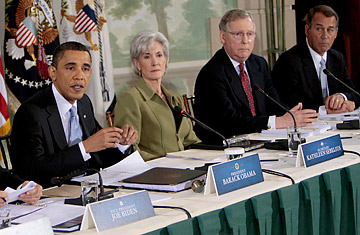
President Barack Obama speaks during the health care reform meeting at the Blair House in Washington, Thursday, Feb. 25, 2010
Common ground was a scarce commodity at Thursday's all-day health care summit in Washington. "Let's talk about some areas where we disagree and see if we can bridge those gaps," President Obama had implored at the outset. But by the end of the session more than seven hours later, it was clearer than ever that the two parties have fundamentally — and irreconcilably — different views of how to go about fixing the nation's health care system.
Or, for that matter, how much of it can even be fixed in the near term. As Tennessee Senator Lamar Alexander put it, leading off for the Republicans, "Our country is too big, too complicated, too decentralized for Washington, a few of us here, just to write a few rules about remaking 17% of the economy all at once."
It was also made evident that if the Democrats want to pass a health care bill this year, they will have to go it alone — and that they are preparing to do just that. Again and again, they brushed aside Republicans who insisted that they should scrap the legislation that they have been working on for more than a year and start all over again. Americans, said House Speaker Nancy Pelosi, "don't have time for us to start from scratch. Many of them are at the end of the line."
Nor were Democrats willing to scale back their ambitious and comprehensive plan in favor of a more incremental approach. "We'd love to have a five-page bill," Obama said to the Republicans who arrived toting copies of the massive Senate-passed legislation. "It would save an awful lot of work. The reason we didn't do it is because it turns out that baby steps don't get you to the place where people need to go."
With Democratic leaders having decided to go forward on health care, it remains to be seen whether they will be able to muster enough of their own votes to get it done. The procedural and political hurdles ahead are formidable, and with each new poll showing public confidence slipping away, they know that time is not on their side. Yet, they say, they believe that if they can pass the bill, they can sell it too. Once voters can look beyond the messy political process and dealmaking that it took to get this far, they may once again be able to focus on the actual substance of the legislation, which still enjoys broad support.
"We cannot have another yearlong debate about this. So the question that I'm going to ask myself and I ask of all of you is, Is there enough serious effort that in a month's time or a few weeks' time or six weeks' time, we could actually resolve something?" Obama said as the session drew to a close. "And if we can't, then I think we've got to go ahead and make some decisions, and then that's what elections are for. We have honest disagreements about — about the vision for the country, and we'll go ahead and test those out over the next several months till November." It's a big and risky bet, and the Democrats are going all-in.
